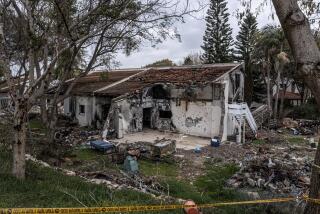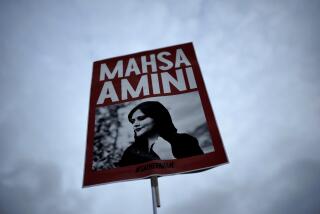Bahrain’s king promises reform after torture report
- Share via
Reporting from Beirut — Bahrain’s king on Wednesday promised reforms after an international commission reported that security officials used excessive force and torture against mostly Shiite Muslim protesters who rose up against the Sunni monarchy.
Authorities had hoped the long-awaited findings, presented at a palace event attended by King Hamed ibn Isa Khalifa, would begin to heal a nation that remains deeply divided since major protests were crushed in March, even as pro-democracy uprisings spread through the Arab world.
But the report did not satisfy opposition leaders and human rights activists, who remain deeply skeptical of the government’s willingness to change.
Nor did the report convince U.S. officials to resume plans to sell $53 million worth of military hardware to the strategic Persian Gulf nation that is home to the U.S. Navy’s 5th Fleet. Bahraini officials contend the hardware is needed to defend the country against Shiite Iran, but the deal was suspended this fall under pressure from Congress.
The king listened somberly Wednesday as Mahmoud Cherif Bassiouni, who headed the five-month inquiry, outlined a catalog of abuses committed during the crackdown. They included late-night raids by men in balaclavas, beatings of detainees with metal rods, the use of electric shocks, the destruction of Shiite mosques and purges from universities and workplaces.
At least 35 people were killed in the violence, including five security force members, said Bassiouni, an Egyptian American international law expert.
Hamed said those responsible for abuses would be held accountable and laws reformed to bring them in line with international standards. Before the report was released, authorities announced that they had filed 20 prosecution cases against security force members.
“Any government which has a sincere desire for reform and progress understands the benefit of objective and constructive criticism,” he said.
But the king appeared to take issue with the finding that there was no involvement by Iran, saying, “Iran’s propaganda fueled the flames of sectarian strife — an intolerable interference in our internal affairs from which Bahrain has suffered greatly.”
The inquiry also found no evidence of abuses by troops sent by Saudi Arabia and the United Arab Emirates to bolster Bahrain’s security forces, a finding disputed by local human rights groups.
The king’s assurances did not convince activists, who said authorities used tear gas and rubber bullets to disperse a number of protests Wednesday.
“It seems that we are continuing on the same road,” said Nabeel Rajab, who heads the Bahrain Center for Human Rights. “I don’t think the attitudes of the government will change because of the report.”
Activists questioned the independence of the panel, which was funded by the monarchy, noting that it put the blame for serious violations on individuals acting outside the law. “Repression happened because of the policy of the government and the authorities,” said Mohammed Maskati, who heads the Bahraini Youth Society for Human Rights.
Khalil Marzooq, spokesman for the main Shiite Wefaq party, complained that authorities did not take “decisive steps,” such as releasing detainees and forming a new, more inclusive government.
Instead, the king said a panel would be appointed to study the report’s recommendations and suggest ways to quickly implement them.
While praising the king for commissioning the report, U.S. officials have been telling both sides that they should not miss the opportunity to work out a way to resolve their differences. Without a political deal, they argue, major protests will resume, threatening to undermine the kingdom and strengthen the hand of Iran.
“We are deeply concerned about the abuses identified in the report and urge the government and all elements of Bahraini society to address them in a prompt and systematic manner,” U.S. Secretary of State Hillary Rodham Clinton said in a statement. “It is essential for Bahrainis themselves to resolve the issues identified in the report and move forward in a way that promotes reform, reconciliation and stability.”
Times staff writer Paul Richter in Washington and special correspondent Rima Marrouch in Beirut contributed to this report.
More to Read
Sign up for Essential California
The most important California stories and recommendations in your inbox every morning.
You may occasionally receive promotional content from the Los Angeles Times.












